
The men's 200 metre freestyle event at the 2004 Summer Olympics was contested at the Olympic Aquatic Centre of the Athens Olympic Sports Complex in Athens, Greece. The event took place on 15 and 16 August. There were 59 competitors from 53 nations, with each nation having up to two swimmers.

The United States competed at the 1972 Summer Olympics in Munich, West Germany. 400 competitors, 316 men and 84 women, took part in 185 events in 21 sports.
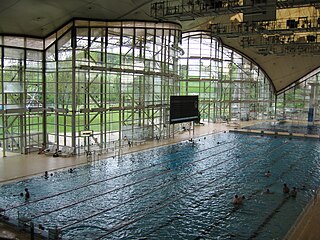
The 1972 Summer Olympics were held in Munich, West Germany, 29 events in swimming were contested. There was a total of 532 participants from 52 countries competing.
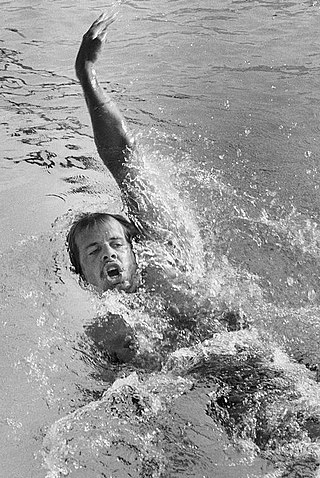
The men's 200 metre backstroke event for the 1976 Summer Olympics was held in Montreal. The event took place on 24 July. There were 33 competitors from 23 nations, with each nation having up to 3 swimmers. The event was won by John Naber of the United States in world-record time; he was the first person to swim the event in under 2 minutes (1:59.19). It was Naber's fifth medal of the Games: completing a double in the backstroke events as well as golds in the medley relay and the 4×200 free relay, along with a silver in the 200 free. It was the second American victory and second American medal sweep in the men's 200 metre backstroke, after 1968; of the 12 medals from 1968 through 1976, 10 were won by Americans and the other two by Roland Matthes. Peter Rocca (silver) and Dan Harrigan (bronze) were the other two Americans, along with Naber, to reach the podium in 1976. The rules changed in 1984 to limit nations to two swimmers each, preventing further sweeps.
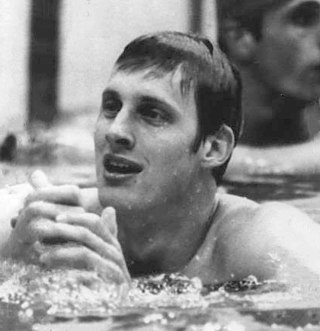
The men's 100 metre freestyle event at the 1976 Summer Olympics took place between July 24 and 25. This was the first time in history that the 100m freestyle was swum under 50 seconds. There were 41 competitors from 27 nations. Nations had been limited to three swimmers each since the 1924 Games. The event was won by Jim Montgomery of the United States, the nation's second consecutive and tenth overall victory in the men's 100 metre freestyle. His countryman Jack Babashoff took silver. Peter Nocke's bronze was the first medal for West Germany in the event, though the United Team of Germany had won a bronze in 1964.

The men's 200 metre freestyle event at the 1992 Summer Olympics took place on 26 July at the Piscines Bernat Picornell in Barcelona, Spain. There were 55 competitors from 39 nations, with each nation having up to two swimmers. The event was won by Yevgeny Sadovyi of the Unified Team; it was the first victory in the men's 200 metre freestyle by an athlete from the former Soviet Union since Moscow 1980. Anders Holmertz of Sweden repeated as the silver medalist, becoming the first man to win multiple medals in the event. Antti Kasvio earned a bronze medal in Finland's debut in the event.

The men's 200 metre freestyle event at the 1996 Summer Olympics took place on 20 July at the Georgia Tech Aquatic Center in Atlanta, United States. There were 43 competitors from 36 nations, with each nation having up to two swimmers. The event was won by Danyon Loader of New Zealand, the nation's first medal in the men's 200 metre freestyle. Brazil also received its first medal in the event, with Gustavo Borges taking silver. Bronze went to Australia's Daniel Kowalski.

Bruce MacFarlane Furniss is a former American amateur competition swimmer, Olympic double gold medalist, and ten-time world record-holder in four events. At the 1976 Summer Olympics in Montreal, Quebec, he won the Men's 200-meter Freestyle and was a member of the winning U.S. team in the Men's 4×200-meter Freestyle Relay, both in world record time. Furniss broke ten world and nineteen American records, and won eleven Amateur Athletic Union and six NCAA titles.

Steven Charles Furniss is an American former swimmer, business owner, Olympic bronze medalist and world record-holder.

The men's 200 metre backstroke event at the 2000 Summer Olympics took place on 20–21 September at the Sydney Olympic Park Aquatic Centre in Sydney, Australia. There were 45 competitors from 38 nations. Each nation had been limited to two swimmers in the event since 1984. The event was won by Lenny Krayzelburg of the United States, with his countryman Aaron Peirsol taking silver. It was the second consecutive Games that Americans had finished one-two in the event. Bronze went to Matt Welsh of Australia, the nation's first medal in the event since 1980.

The men's 200 metre freestyle event at the 1984 Summer Olympics was held in the McDonald's Olympic Swim Stadium in Los Angeles, California, on July 29, 1984. There were 56 competitors from 36 nations, with each nation having up to two swimmers. The event was won by Michael Gross of West Germany, the nation's first victory in the event. His countryman Thomas Fahrner took bronze. Americans placed second and fourth, with Mike Heath earning silver and Jeff Float in fourth place.

The men's 200 metre backstroke event at the 1984 Summer Olympics was held in the Uytengsu Aquatics Center in Los Angeles on July 31, 1984. There were 34 competitors from 25 nations, with each nation limited to two swimmers. The event was won by Rick Carey of the United States, the nation's third victory in the men's 200 metre backstroke. Frédéric Delcourt of France took silver and Cameron Henning of Canada earned bronze; it was the first medal in the event for each of those two nations.
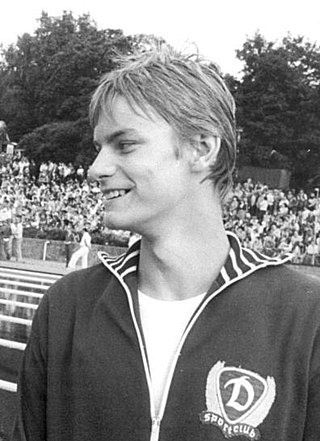
The men's 100 metre freestyle event at the 1980 Summer Olympics was held on 26 and 27 July at the Swimming Pool at the Olimpiysky Sports Complex. There were 39 competitors from 26 nations. Nations had been limited to three swimmers each since the 1924 Games. The event was won by Jörg Woithe of East Germany, the nation's first medal in the men's 100 metre freestyle. Sweden earned its first medals in the event since 1952 with Per Holmertz's silver and Per Johansson's bronze.
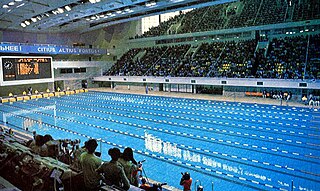
The men's 200 metre freestyle event at the 1980 Summer Olympics was held on 21 July at the Swimming Pool at the Olimpiysky Sports Complex. There were 42 competitors from 24 nations, with each nation having up to three swimmers. The event was won by Sergey Koplyakov of the Soviet Union, with his countryman Andrey Krylov finishing second. The medals were the first for the Soviet Union in the men's 200 metre freestyle. Graeme Brewer of Australia won that nation's first medal in the event since 1968 with his bronze.
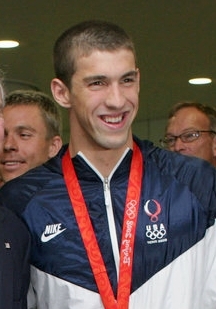
The men's 200 metre freestyle event at the 2008 Olympic Games took place on 10–12 August at the Beijing National Aquatics Center in Beijing, China. There were 58 competitors from 50 nations.

The men's 100 metre freestyle event at the 1952 Summer Olympics took place between 26 and 27 July at the Helsinki Swimming Stadium. There were 61 competitors from 33 nations. Nations had been limited to three swimmers each since the 1924 Games. The event was won by Clarke Scholes of the United States, the nation's second consecutive and seventh overall victory in the men's 100 metre freestyle. Japan, absent from the 1948 Games after World War II, returned to the podium in the event with Hiroshi Suzuki's silver. Göran Larsson earned Sweden's first medal in the event since 1908 with his bronze.

The men's 100 metre freestyle event at the 1968 Olympic Games took place between 18 and 19 October. There were 64 competitors from 34 nations. Nations had been limited to three swimmers each since the 1924 Games. The event was won by Michael Wenden of Australia, the nation's third victory in four Games. Americans Ken Walsh and Mark Spitz took silver and bronze, respectively.

The men's 200 metre freestyle event at the 1968 Olympic Games took place on 24 October at the Alberca Olímpica Francisco Márquez. It was the third time the event was held, returning for the first time since 1904. There were 57 competitors from 26 nations, with each nation having up to three swimmers. The event was won by Michael Wenden of Australia, the nation's second victory in the event ; Australia extended its podium streak in the event to three Games over 68 years. It was Wenden's second gold medal of the Games, completing a 100/200 free double. Americans Don Schollander and John Nelson took silver and bronze, respectively.

The men's 100 metre freestyle event at the 1972 Olympic Games took place between September 2 and 3. There were 48 competitors from 29 nations. Nations had been limited to three swimmers each since the 1924 Games. The event was won by Mark Spitz of the United States, his then-record sixth gold medal in a single Games. It was the ninth victory in the event for an American, most of any nation. Jerry Heidenreich, also of the United States, took silver. Soviet swimmer Vladimir Bure earned bronze, the nation's first medal in the men's 100 metre freestyle.
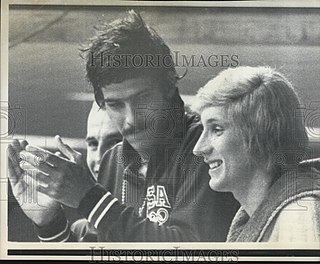
The men's 200 metre freestyle event at the 1972 Summer Olympics took place on August 29 at the Olympia Schwimmhalle. There were 46 competitors from 27 nations, with each nation having up to three swimmers. The event was won by Mark Spitz of the United States, the nation's second victory in the event. It was the third gold medal for Spitz in 1972, halfway to his goal of six. His teammate Steve Genter took silver, with Werner Lampe of West Germany earning bronze. Defending champion Michael Wenden of Australia finished fourth.




















